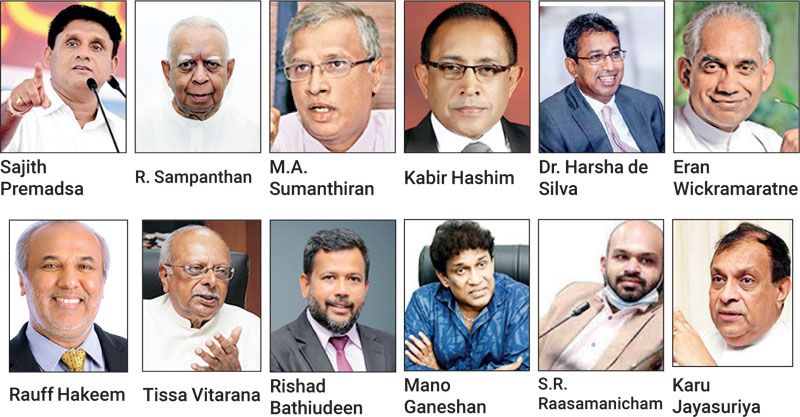Sunday Feb 22, 2026
Sunday Feb 22, 2026
Monday, 14 February 2022 04:30 - - {{hitsCtrl.values.hits}}

In a welcome move of solidarity given the unprecedented economic crisis, the Opposition has come together urging the Government to go for an orderly negotiated postponement and restructure of foreign debt repayment estimated at $ 25 billion between now and 2026. In a signed ‘collective response to the economic crisis’, 12 Opposition leaders and MPs said the “best way forward for Sri Lanka is to Immediately initiate a multi-step process towards an orderly negotiated postponement and restructure of repayment of its sovereign debt.”
It said Sri Lanka can then correct its policies towards a path of sustainable economic growth and debt management, while also ensuring access to essential needs and goods for the Sri Lankan economy and its people.
“This will reduce the pain and hardship that is currently experienced due to the shortage of foreign currency. In any path forward, it is essential that the Government takes measures to consider the difficulties of the poorest and the most vulnerable people in the country and provide them with adequate social security, protection, and relief,” the collective statement said.
The Opposition call is despite Central Bank Governor Ajith Nivard Cabraal reiterating that Sri Lanka has been pursuing an exercise of debt restructuring (reducing International Sovereign Bonds with the use of new bilateral and multilateral loans) and the country can and will honour all its future debt obligations.
Following is the full text of Opposition.
We the undersigned, recognising the unprecedented nature of the economic challenges facing us, seek urgent, constructive, and sustainable solutions to this pressing situation.
We note that:
1.The country’s ratings have fallen to the level of being blacklisted in international credit markets. Since April 2020, Sri Lanka has been locked out of borrowing using International Sovereign Bonds (ISBs) in the international market
2.Repaying dollar debt in this context means that the usable foreign reserves are down to below one month of imports – the lowest on record since independence
3.The ratio of interest on debt to Government revenue was above 70% in 2020, a historical high for Sri Lanka, and amongst the highest in the world
4.The ratio of public debt compared to the value of Sri Lanka's domestic production (GOP) is also the highest on record, at 120%. It skyrocketed, by almost 25 percentage points, in the last two years. Each of these situations by themselves would spell a serious economic challenge
Occurring simultaneously, this pressing and historic economic crisis is threatening our future, in both the short term and long term.
We recognise that undoubtedly the Government has a daunting task ahead, and as a country there is a need for us all to come together to overcome this challenge.
We acknowledge that Sri Lanka should take immediate measures to ensure strong social welfare for its people so that the poor and vulnerable communities are protected from the adverse impact of this economic crisis.
We further acknowledge the need for sound reform to the national economic policy that will address the root causes for this situation and ensure sustainable solutions to steer the country out of this unprecedented economic crisis, and forge an equitable and just solution for our future generations.
We are fully cognisant that Parliament has full control of public finance, and that each member of Parliament has a fiduciary responsibility to ensure the proper management of public finances in Sri Lanka.
In such a context, we recognise the best way forward for Sri Lanka is to Immediately initiate a multi-step process towards an orderly negotiated postponement and restructure of repayment of its sovereign debt. Sri Lanka can then correct its policies towards a path of sustainable economic growth and debt management, while also ensuring access to essential needs and goods for the Sri Lankan economy and its people.
This will reduce the pain and hardship that is currently experienced due to the shortage of foreign currency. In any path forward, it is essential that the Government takes measures to consider the difficulties of the poorest and the most vulnerable people in the country and provide them with adequate social security, protection, and relief.